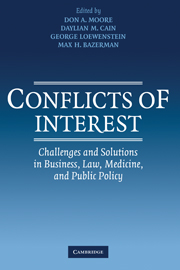Book contents
- Frontmatter
- Contents
- List of Contributors
- Acknowledgments
- Introduction
- PART ONE BUSINESS
- 1 Managing Conflicts of Interest within Organizations: Does Activating Social Values Change the Impact of Self-Interest on Behavior?
- 2 Commentary: On Tyler's “Managing Conflicts of Interest within Organizations”
- 3 A Review of Experimental and Archival Conflicts-of-Interest Research in Auditing
- 4 Commentary: Conflicts of Interest in Accounting
- 5 Bounded Ethicality as a Psychological Barrier to Recognizing Conflicts of Interest
- 6 Commentary: Bounded Ethicality and Conflicts of Interest
- 7 Coming Clean but Playing Dirtier: The Shortcomings of Disclosure as a Solution to Conflicts of Interest
- 8 Commentary: Psychologically Naive Assumptions about the Perils of Conflicts of Interest
- PART TWO MEDICINE
- PART THREE LAW
- PART FOUR PUBLIC POLICY
- Index
- References
3 - A Review of Experimental and Archival Conflicts-of-Interest Research in Auditing
Published online by Cambridge University Press: 04 August 2010
- Frontmatter
- Contents
- List of Contributors
- Acknowledgments
- Introduction
- PART ONE BUSINESS
- 1 Managing Conflicts of Interest within Organizations: Does Activating Social Values Change the Impact of Self-Interest on Behavior?
- 2 Commentary: On Tyler's “Managing Conflicts of Interest within Organizations”
- 3 A Review of Experimental and Archival Conflicts-of-Interest Research in Auditing
- 4 Commentary: Conflicts of Interest in Accounting
- 5 Bounded Ethicality as a Psychological Barrier to Recognizing Conflicts of Interest
- 6 Commentary: Bounded Ethicality and Conflicts of Interest
- 7 Coming Clean but Playing Dirtier: The Shortcomings of Disclosure as a Solution to Conflicts of Interest
- 8 Commentary: Psychologically Naive Assumptions about the Perils of Conflicts of Interest
- PART TWO MEDICINE
- PART THREE LAW
- PART FOUR PUBLIC POLICY
- Index
- References
Summary
ABSTRACT
I review empirical (archival and experimental) accounting research that has addressed the issue of conflicts of interest, focusing on the audit setting that has received so much recent attention. I start with a brief discussion of the audit function and auditors' incentives, viewing auditors as weighing incentives that favor acceding to client demands against incentives that favor resisting client demands, and also as influenced by psychological and social aspects of audit settings. Then, I discuss various different research approaches to investigating conflicts of interest in this setting. The review is not intended to be exhaustive. Rather, I highlight key strengths and weaknesses of each approach and illustrate each approach with a representative study. I also discuss the main insights provided by each approach. I finish by relating the insights provided by different approaches and suggesting some directions for future research.
The general topic of conflicts of interest has been of particular recent concern in accounting and auditing. Large financial failures and accounting scandals suggest potential conflicts that have reduced the effectiveness of corporate governance, the reliability of financial statements, and ultimately investor confidence. Policy makers have responded with unusual speed by passing numerous new regulations, culminating in passage of the Sarbanes-Oxley Act in July 2002. Yet, many of these regulatory changes have occurred without much consideration of evidence provided by the extant experimental and archival empirical research literatures.
- Type
- Chapter
- Information
- Conflicts of InterestChallenges and Solutions in Business, Law, Medicine, and Public Policy, pp. 41 - 69Publisher: Cambridge University PressPrint publication year: 2005
References
- 19
- Cited by



